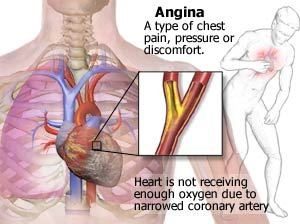The heart is made up of muscle and needs sufficient blood supply in order to receive oxygen. Without oxygen it will not be able to contract and pump blood to the rest of the body. The heart also pumps blood to itself through the coronary arteries. When the coronary arteries narrow, it may make it difficult for blood, hence oxygen, to reach the heart, especially during strenuous activity such as exercise. This results in an ache in the muscle of the heart often known as ‘chest pain’. Further narrowing of the arteries can worsen the flow of blood to the heart, provoking symptoms. The typical symptoms of chest pain and shortness of breath, especially upon exertion, is called Angina Pectoris.
Courtesy of www.iahealth.net
In people with angina, coronary heart disease is the most common cause of reduced blood flow to the heart. Coronary heart disease is caused by a build-up of fat inside the arteries which causes them to become narrow. The reduction in the blood flow is temporary and if treated promptly does not result in muscle damage in the heart. However, people with angina are at higher risk of having a heart attack and must monitor their condition closely.
There are two main types of angina:
- Stable Angina: Chest pain which lasts for approximately 10-15 minutes following strenuous activity such as exercise, exertion, or emotional stress. The pain is relieved by Angina medication and sufferers usually take the medication prior to strenuous activity to prevent an attack.
- Unstable Angina: Chest pain lasts longer than 15 minutes and often occurs without a trigger. It is not completely relieved by Angina medication and may indicate the occurrence of a heart attack.
Signs and Symptoms
- Chest pain or discomfort
- Shortness of breath
- Tiredness
- Pain or discomfort in the arms, neck, jaw shoulder or back
- Pain similar to indigestion or heartburn
- Nausea or vomiting
- Sweating
It is important to appreciate that women may have atypical symptoms leading to a delayed recognition of the condition. Hence, regular check-up of the heart is imperative when women experience nausea, abdominal pain or shortness of breath.
Treatment and Prevention
Angina is often caused by strenuous activity therefore lifestyle changes can prevent the symptoms:
- Prevent the risk factors such as hypertension, dyslipidemia, smoking, excess weight and diabetes.
- Take angina medication before exertion. The most common medication for angina is Glyceryl trinitrate (GTN) spray which is sprayed under the tongue
- Rest when symptoms are present
- Take regular breaks
- Keep warm
- Avoid eating large meals
For further information contact the Heart Foundation www.heartfoundation.org.nz
Dr Sarkaw Mohammad (Chiropractor)
Mobile: 021 100 7363
Hillcrest Spinal Centre
174 Cambridge Road, Hamilton.







